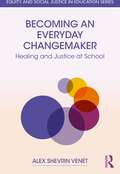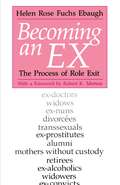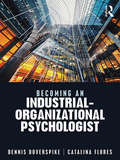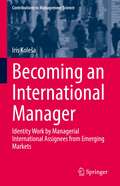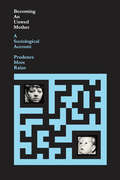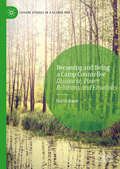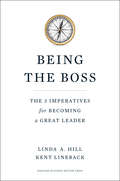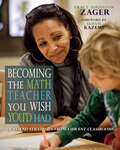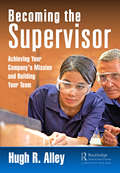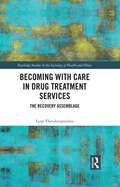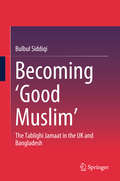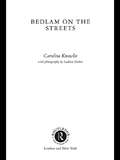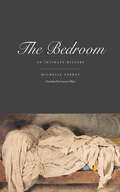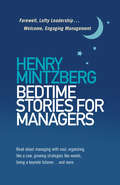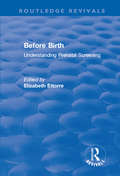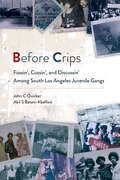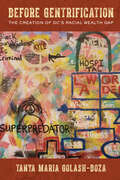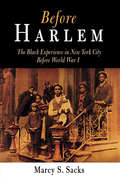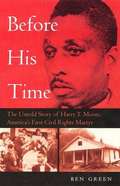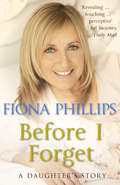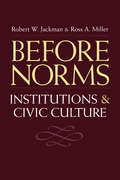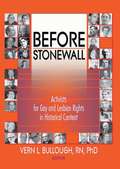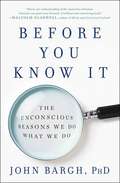- Table View
- List View
Becoming an Everyday Changemaker: Healing and Justice At School (Equity and Social Justice in Education Series)
by Alex Shevrin VenetEducators with a vision for more equitable, caring schools often struggle with where to begin. I’m just one teacher, where can I start to make change? Is it even possible? How do I do this within current constraints? In this new book, bestselling author Alex Shevrin Venet empowers everyday changemakers by showing how equity-centered trauma-informed practices can guide our approach to school change. Unlike other books on social justice, this powerful resource doesn’t tell you which changes to implement; instead, it focuses on helping you develop the skills, strategies, and tools for making change meaningful and effective.Topics include change opportunities and why trauma makes change harder; skills for navigating the change journey such as building relationships, working from strengths, and navigating many streams of information; and sustainable structures for lasting change. Throughout, there are reflection questions to use as conversation-starters with fellow changemakers, as well as Rest Stops so you can pause and process what you are thinking about and learning. This book will help you start your change journey now, putting you and your students on the path to equity, justice, and healing.
Becoming an Ex: The Process of Role Exit
by Helen Rose Fuchs EbaughThe experience of becoming an ex is common to most people in modern society. Unlike individuals in earlier cultures who usually spent their entire lives in one marriage, one career, one religion, one geographic locality, people living in today's world tend to move in and out of many roles in the course of a lifetime. During the past decade there has been persistent interest in these "passages" or "turning points," but very little research has dealt with what it means to leave behind a major role or incorporate it into a new identity. Helen Rose Fuchs Ebaugh's pathbreaking inquiry into the phenomenon of becoming an ex reveals the profundity of this basic aspect of establishing an identity in contemporary life. Ebaugh is herself an ex, having left the life of a Catholic nun to become a wife, mother, and professor of sociology. Drawing on interviews with 185 people, Ebaugh explores a wide range of role changes, including ex-convicts, ex-alcoholics, divorced people, mothers without custody of their children, ex-doctors, ex-cops, retirees, ex-nuns, and—perhaps most dramatically—transsexuals. As this diverse sample reveals, Ebaugh focuses on voluntary exits from significant roles. What emerges are common stages of the role exit process—from disillusionment with a particular identity, to searching for alternative roles, to turning points that trigger a final decision to exit, and finally to the creation of an identify as an ex.Becoming an Ex is a challenging and influential study that will be of great interest to sociologists, mental health counselors, members of self-help groups such as Alcoholics Anonymous and Parents Without Partners, those in corporate settings where turnover has widespread implications for the organization, and for anyone struggling through a role exit who is trying to establish a new sense of self.
Becoming an Industrial-Organizational Psychologist
by Dennis Doverspike Catalina FloresSo you want to be an Industrial-Organizational (I-O) Psychologist? You may have heard that it is one of the fields of the future, fast-growing, and a highly sought-after profession. But what is Industrial-Organizational Psychology? What does an Industrial-Organizational Psychologist do? Answering these questions and many more, Becoming an Industrial-Organizational Psychologist is the perfect introduction, providing an expert overview of careers in Industrial-Organizational Psychology, the study of human behavior in the workplace. Part 1 of the book discusses what I-O Psychology is and what I-O Psychologists do, including the history of the field, research areas, and job types and titles. Part 2 discusses the undergraduate years, including how to make oneself competitive for graduate school, and going through the process of identifying graduate programs, applying, and deciding on the right program. Part 3 focuses on the graduate years, including advice on success in a graduate program and in internships, as well as additional issues like licensure and transitioning from other careers. Finally, Part 4 discusses how to find a job and begin a career in the various sectors of I-O Psychology: academic, consulting, industry, and government.
Becoming an International Manager: Identity Work by Managerial International Assignees from Emerging Markets (Contributions to Management Science)
by Iris KolešaThe book discusses international assignment-related decision-making by emerging market firms and their employees. It reveals that the ongoing, reciprocal interactions between the organisational and individual discourses, structures, processes, and the wider macro context spark multilevel role transitions and identity work. The book uncovers the macro-, meso-, and micro-level factors of role transitions and identity work, as well as their outcomes for international staffing. It also expands on the role (transition), social categorisation, and social identity theories by applying them to international staffing. Finally, it presents practical insights for international human resources managers by presenting several 'soft' approaches to managing international employee mobility, such as employer branding, prioritisation of favourable discourses and identities, and encouraging role hybridisation.
Becoming an Unwed Mother: A Sociological Account
by Prudence Mors RainsMost unmarried women who engage in sexual intercourse do not become unwed mothers; they use contraceptives, secure an abortion, or get married before the baby is born. What happens to the minority of women who bear illegitimate children? This book is the first study to describe in detail the actual situation of unwed motherhood, as opposed to the causes and pathology of deviance. Based largely on observation of middle-class white girls in a psychiatricallyoriented mater nity home and lower-class black teenagers in a day school for unwed mothers, the study focuses on the unwed mother's moral career as it is shaped by social agencies.
Becoming and Being a Camp Counsellor: Discourse, Power Relations and Emotions (Leisure Studies in a Global Era)
by Mandi BakerThis book explores the complexities of the recreational summer camp experience and its reliance on the expertise and emotion work of young people. Drawing on post-structural theory, Baker illustrates the discourses, power relations and emotional demands that shape camp counsellor employment experiences and well-being. Through analysis of everyday experiences and interactions, Baker unpicks the power nexus between counsellors, campers, peers and camp management, offering a deeper understanding of camp counsellor employment and the challenges for camp employees and employers. As such, this book raises a call for camp researchers and industry leaders to engage in rethinking how camp counsellor roles are understood, shaped and embodied, and how they might be ethically supported through reflexive management practices. Becoming and Being a Camp Counsellor will be of interest to scholars and students across the fields of leisure, outdoor recreation, youth studies, and sociology.
Becoming the Math Teacher You Wish You'd Had: Ideas and Strategies from Vibrant Classrooms
by Tracy Johnston ZagerAsk mathematicians to describe mathematics and they' ll use words like playful, beautiful, and creative. Pose the same question to students and many will use words like boring, useless, and even humiliating. Becoming the Math Teacher You Wish You' d Had, author Tracy Zager helps teachers close this gap by making math class more like mathematics. Zager has spent years working with highly skilled math teachers in a diverse range of settings and grades and has compiled those' ideas from these vibrant classrooms into' this game-changing book. Inside you' ll find: ' How to Teach Student-Centered Mathematics:' Zager outlines a problem-solving approach to mathematics for elementary and middle school educators looking for new ways to inspire student learning Big Ideas, Practical Application:' This math book contains dozens of practical and accessible teaching techniques that focus on fundamental math concepts, including strategies that simulate connection of big ideas; rich tasks that encourage students to wonder, generalize, hypothesize, and persevere; and routines to teach students how to collaborate Key Topics for Elementary and Middle School Teachers:' Becoming the Math Teacher You Wish You' d Had' offers fresh perspectives on common challenges, from formative assessment to classroom management for elementary and middle school teachers No matter what level of math class you teach, Zager will coach you along chapter by chapter. All teachers can move towards increasingly authentic and delightful mathematics teaching and learning. This important book helps develop instructional techniques that will make the math classes we teach so much better than the math classes we took.
Becoming the Supervisor: Achieving Your Company's Mission and Building Your Team
by Hugh R. AlleyBecoming a Supervisor tells the story of Trevor who works as one of the production team in a small company that makes toy boats. He is thrust into the role of supervisor unexpectedly when his general manager reacts to his constant suggestions of how things could be better. When the GM becomes ill, Trevor struggles to take up the slack for several months until a new GM arrives. The core of the book follows Trevor’s growth under the coaching of Julie, his new GM. As Trevor deals with one challenge after another, Julie guides him on a journey to learn the core skills needed by all front-line leaders. The reader takes away four key ideas: (1) Front-line leadership skills are not too complicated to learn. (2) These skills are something that they can develop in themselves, regardless of what their organization does. (3) Tools and skills are there to help solve real business problems; implementing the tools is not a strategy. (4) In your role as supervisor (directing or responsible for others) you have to look after the mission of the company AND look after your people – doing only one is not an option. Essentially, this book is intended to give hope to a new supervisor or team lead. They will finish the book knowing that the skills they need can be learned and aren’t that difficult to acquire. It is designed to introduce the central skills that any supervisor has to be able to master at least with a basic working competency: instructing, leading, and making improvements in their own area. It introduces some of the more widely used tools that a new supervisor may need. More importantly, it ties these tools and skills to solving particular problems. Readers will understand that the tools are not important for their own sake, but only to the extent that the tools serve the larger objective of the organization. This book is designed to give the reader an entertaining and hopeful story about the very difficult transition from worker to supervisor, from being one of the crew to directing the crew. It is an emotionally tough transition, and the idea that someone could see a model of how it can work out will be helpful to folks new in a leadership role. Finally, the book provides a reference to other sources of information that will let the reader extend their learning about each of the tools or skills referenced in the contents.
Becoming with Care in Drug Treatment Services: The Recovery Assemblage
by Lena TheodoropoulouEmploying Deleuzo-Guattarian orientations to assemblage and feminist approaches to care, this book offers a critique of neoliberal approaches to recovery from drugs and alcohol, while collapsing the dualities of harm reduction and recovery. This monograph empirically explores the practices of care emerging in two drug recovery services in Liverpool and Athens. Following the flows of the participants’ desires, it argues that it is not the lack of the substance that holds the recovery assemblage together, but the production of connections that enhance a body’s power of acting, constituting recovery a practice of collective care. The outcome of the analysis of the lived experiences of people in recovery is a call for the dismissal of policy as an intervention coming from outside, and its reconstitution as a practice produced inside the recovery assemblage. Focusing on the value of the assemblage as a viable methodological, ontological and epistemological orientation for critical drug studies, this volume contributes to the sociology of health and illness, and will appeal to students and researchers interested in fields such as Deleuzian Studies, Science and Technology Studies, Sociology and Social Policy, Drugs and Addiction, Public Health and Medical Anthropology.
Becoming ‘Good Muslim’: The Tablighi Jamaat in the UK and Bangladesh
by Bulbul SiddiqiThe book uses an ethnographic approach to explore why the Tablighi Jamaat movement remains so successful in contemporary times. It shows that this success results from the positive image that it cultivates, and the systematic preaching activities of Tablighi Jamaat followers, and that the organisation's apolitical image, the public profile of the ijtema, the humbleness of Tablighi followers, and the attraction of belonging to the global Tablighi community all help to create a positive image of the Tablighi Jamaat among ordinary Muslims. The book also argues that the Tablighi Jamaat remains successful because of its ability to hold its followers within a Tablighi-guided life, which is perceived as protection against the Western lifestyle. Many elements of contemporary Western lifestyle are considered non-Islamic, and so by clearly defining what is Islamic and non-Islamic in modern society, the Tablighi Jamaat provides a way in which Muslims can live in the contemporary world, but remain good Muslims.
Bedeutende Daten: Modelle, Verfahren und Praxis der Vermessung und Verdatung im Netz (Medien • Kultur • Kommunikation)
by Thorben Mämecke Jan-Hendrik Passoth Josef WehnerDieser Band diskutiert die Entwicklung, dass, wer sich im Netz bewegt, mit Beobachtung rechnen muss. Mit immer geringerem Aufwand sind sowohl Regierungen, Wirtschaftsunternehmen, Meinungs- und Konsumforschung als auch Privatpersonen in der Lage, Netzaktivitäten und Datenspuren zu erfassen und zu analysieren.
Bedeutsame Momente und Erfolgsfaktoren im Online-Coaching: Grundlagen – Erfahrungsberichte – Analysen
by Harald Geißler Michael Fritsch Volker Naumann Andreas Broszio Vesna SadowskiDie vorliegende Coaching-Forschung bezieht sich bisher fast nur auf Face-to-Face-Coaching. Angesichts des aktuellen Booms von Online-Coaching stellt sich deshalb die Frage, ob bzw. mit welchen Modifikationen die vorliegenden Forschungsergebnisse auch für Online-Coaching gelten. Darüber hinaus stellt sich die ebenfalls wenig geklärte Frage, wie sich Erfolge im Coaching angemessen konzeptionalisieren lassen. Diese beiden Fragen beantwortet die vorliegende Untersuchung, indem gezeigt wird, wie der Erfolg von Online-Coaching entscheidend durch den Einsatz und die methodische Gestaltung digitaler Medien bestimmt wird, und dass dabei die Erfolge, die sich bereits im Coachingprozess einstellen, besonders wichtig sind. Diese werden als „Bedeutsame Momente“ bezeichnet und in einer qualitativen Fallstudie empirisch rekonstruiert.
Bedlam on the Streets
by Caroline KnowlesWhat happens when the mad are let out of the asylum and there is nowhere for them to go?This hard-hitting and controversial new book traces the terms on which the mad occupy the city's streets, homeless shelters, shopping centres and fast food outlets. This social geography of madness is situated within the broader parameters of systems of social welfare and globalization, arguing that the 'community mental health care' system is actually a system of neglect.Bedlam on the Streets is a richly textured ethnography combining stark photographic images of people and places with an examination of city space and the voices of those that we label "mad".
Bedroom: An Intimate History
by Lauren Elkin Michelle PerrotAn erudite and highly enjoyable exploration of the most intriguing of personal spaces, from Greek and Roman antiquity through today The winner of France’s prestigious Prix Femina Essai (2009), this imaginative and captivating book explores the many dimensions of the room in which we spend so much of our lives—the bedroom. Eminent cultural historian Michelle Perrot traces the evolution of the bedroom from the time of the ancient Greeks and Romans to today, examining its myriad forms and functions, from royal king’s chamber to child’s sleeping quarters to lovers’ trysting place to monk’s cell. The history of women, so eager for a room of their own, and that of prisons, where the principal cause of suffering is the lack of privacy, is interwoven with a reflection on secrecy, walls, the night and its mysteries. Drawing from a wide range of sources, including architectural and design treatises, private journals, novels, memoirs, and correspondences, Perrot’s engaging book follows the many roads that lead to the bedroom—birth, sex, illness, death—in its endeavor to expose the most intimate, nocturnal side of human history.
Bedtime Stories for Managers: Farewell to Lofty Leadership. . . Welcome Engaging Management
by Henry MintzbergIf you're like most managers and things keep you up at night, now you can turn to a book that's designed especially for you! But you won't find talking rabbits or princesses here. (There is a cow, but it doesn't jump.) Henry Mintzberg has culled forty-two of the best posts from his widely read blog and turned them into a deceptively light, sneakily serious compendium of sometimes heretical reflections on management. The moral here is this: managers need to leave their castles and find out what's actually going on in their kingdoms. And like real bedtime stories, these essays have metaphors galore. So prepare to grow strategies like weeds and organize like a cow. Discover the maestro myth of managing, find the soft underbelly of hard data, and learn why downsizing is bloodletting and your board should be a bee. Mintzberg writes, “Just try not to be outraged by anything you read, because some of my most outrageous ideas turn out to be my best. They just take a while to become obvious.”
Before Birth: Understanding Prenatal Screening
by Elizabeth EttorreThis title was first published in 2001. Featuring contributions from the UK, Finland, The Netherlands and Greece, this unique book explores the ongoing tensions and important ethical, legal and social issues related to the development of prenatal screening and the growth of new genetic technologies.
Before Crips: Fussin', Cussin', and Discussin' among South Los Angeles Juvenile Gangs (Studies in Transgression)
by John C. Quicker Akil S. Batani-KhalfaniThis groundbreaking book opens the door on the missing record of South Los Angeles juvenile gangs. It is the result of the unique friendship that developed between John Quicker and Akil Batani-Khalfani, aka Bird, who collaborated to show how structural marginality transformed hang-out street groups of non-White juveniles into gangs, paving the way for the rise of the infamous Crips and Bloods. Before Crips uses a macro historical analysis to sort through political and economic factors to explain the nature of gang creation. The authors mine a critical archive, using direct interviews with original gang members as well as theory and literature reviews, to contextualize gang life and gang formation. They discuss (and fuss and cuss about) topics ranging from the criminal economy and conceptions of masculinity to racial and gendered politics and views of violence. Their insider/outsider approach not only illuminates gang values and organization, but what they did and why, and how they grew in a backdrop of inequality and police brutality that came to a head with the 1965 Watts Rebellion. Providing an essential understanding of early South Los Angeles gang life, Before Crips explains what has remained constant, what has changed, and the roots of the violence that continues.
Before Gentrification: The Creation of DC's Racial Wealth Gap
by Tanya Maria Golash-BozaDraws a direct line between redlining, incarceration, and gentrification in an American city. This book shows how a century of redlining, disinvestment, and the War on Drugs wreaked devastation on Black people and paved the way for gentrification in Washington, DC. In Before Gentrification, Tanya Maria Golash-Boza tracks the cycles of state abandonment and punishment that have shaped the city, revealing how policies and policing work to displace and decimate the Black middle class. Through the stories of those who have lost their homes and livelihoods, Golash-Boza explores how DC came to be the nation's "murder capital" and incarceration capital, and why it is now a haven for wealthy White people. This troubling history makes clear that the choice to use prisons and policing to solve problems faced by Black communities in the twentieth century—instead of investing in schools, community centers, social services, health care, and violence prevention—is what made gentrification possible in the twenty-first. Before Gentrification unveils a pattern of anti-Blackness and racial capitalism in DC that has implications for all US cities.
Before Harlem
by Marcy S. SacksIn the years between 1880 and 1915, New York City and its environs underwent a tremendous demographic transformation with the arrival of millions of European immigrants, native whites from the rural countryside, and people of African descent from both the American South and the Caribbean. While all groups faced challenges in their adjustment to the city, hardening racial prejudices set the black experience apart from that of other newcomers. Through encounters with each other, blacks and whites, both together and in opposition, forged the contours of race relations that would affect the city for decades to come.Before Harlem reveals how black migrants and immigrants to New York entered a world far less welcoming than the one they had expected to find. White police officers, urban reformers, and neighbors faced off in a hostile environment that threatened black families in multiple ways. Unlike European immigrants, who typically struggled with low-paying jobs but who often saw their children move up the economic ladder, black people had limited employment opportunities that left them with almost no prospects of upward mobility. Their poverty and the vagaries of a restrictive job market forced unprecedented numbers of black women into the labor force, fundamentally affecting child-rearing practices and marital relationships.Despite hostile conditions, black people nevertheless claimed New York City as their own. Within their neighborhoods and their churches, their night clubs and their fraternal organizations, they forged discrete ethnic, regional, and religious communities. Diverse in their backgrounds, languages, and customs, black New Yorkers cultivated connections to others similar to themselves, forming organizations, support networks, and bonds of friendship with former strangers. In doing so, Marcy S. Sacks argues, they established a dynamic world that eventually sparked the Harlem Renaissance. By the 1920s, Harlem had become both a tragedy and a triumph--undeniably a ghetto replete with problems of poverty, overcrowding, and crime, but also a refuge and a haven, a physical place whose very name became legendary.
Before His Time: The Untold Story Of Harry T. Moore, America's First Civil Rights Martyr
by Ben GreenIn Jim Crow Florida, a young black man's courageous fight to obtain equal rights for blacks ends in a personal tragedy that remains unsolved to this day. This is his story. Before Martin Luther King Jr. began to preach from his pulpit in Montgomery, before the landmark Brown v. Board of Education decision, and before Rosa Parks' famous bus ride, a man named Harry T. Moore toiled in Jim Crow Florida on behalf of the NAACP and the Progressive Voters' League. For seventeen years, in an era of official indifference and outright hostility, the soft-spoken but resolute Moore traveled the back roads of the state on a mission to educate, evangelize, and organize. On Christmas night in 1951, in Mims, Florida, a bomb placed under his bed ended Harry Moore's life. His wife, Harriette, died of her wounds a week later. Although Florida's governor reopened the case in 1991, no one was ever convicted of this crime. Using previously unavailable FBI files, Green introduces his readers to the good and the bad, the villainous and the virtuous, in Jim Crow Florida. In doing so, he offers a poignant and gripping memorial to the pioneering work of Harry T. Moore, one of the earliest martyrs of the modern civil rights movement.
Before I Forget
by Fiona PhillipsFiona Phillips is one of our best-loved television presenters. Well-known for being warm, chatty and down to earth, she attended her local comprehensive in Southampton before studying English in Birmingham. For over twelve years she presented GMTV, during which time she interviewed some of the most famous and influential people on the planet, from film stars to royalty, politicians to local heroes. But in August 2008 Fiona announced that she was to quit the job she loved, revealing that her father, Phil, had been diagnosed with Alzheimer's just a year after her mother had died of the same disease and that she had decided to devote more time to him and to her family. Before I Forget is a wonderfully honest account of growing up in the 1960s and 70s within a complex family. During her childhood her father could sometimes be distant and demanding which both saddened her and drove her to succeed, her mother always the devoted wife and the steady heart of the family. When Fiona lands the job at GMTV she revels in how proud they are of her achievement. When her mother and then her father succumb to Alzheimer's we share in Fiona's sadness as she movingly describes watching them fade away, one moment interviewing George Clooney the next taking a call from Pembrokeshire Social Services to say that her mother had wandered away from her care home.Before I Forget is an extraordinary book which will resonate with Fiona's millions of fans and the millions of people who day-by-day are going through, or have gone through, the same experiences.
Before Norms: Institutions and Civic Culture
by Robert W. Jackman Ross A. MillerThe potato famines of the nineteenth century were long attributed to Irish indolence. The Stalinist system was blamed on a Russian proclivity for autocracy. Muslim men have been accused of an inclination to terrorism. Is political behavior really the result of cultural upbringing, or does the vast range of human political action stem more from institutional and structural constraints? This important new book carefully examines the role of institutions and civic culture in the establishment of political norms. Jackman and Miller methodically refute the Weberian cultural theory of politics and build in its place a persuasive case for the ways in which institutions shape the political behavior of ordinary citizens. Their rigorous examination of grassroots electoral participation reveals no evidence for even a residual effect of cultural values on political behavior, but instead provides consistent support for the institutional view. Before Norms speaks to urgent debates among political scientists and sociologists over the origins of individual political behavior.
Before Stonewall: Activists for Gay and Lesbian Rights in Historical Context
by Vern L BulloughExplore the early history of the gay rights movement!In the words of editor Vern L. Bullough: “Although there was no single leader in the gay and lesbian community who achieved the fame and reputation of Martin Luther King, there were a large number of activists who put their careers and reputations on the line. It was a motley crew of radicals and reformers, drawn together by the cause in spite of personality and philosophical differences. Their stories are told in the following pages.”Before Stonewall: Activists for Gay and Lesbian Rights in Historical Context illuminates the lives of the courageous individuals involved in the early struggle for gay and lesbian civil rights in the United States. Authored by those who knew them (often activists themselves), the concise biographies in this volume examine the lives of pre-1969 barrier breakers like Harry Hay, Henry Gerber, Alfred Kinsey, Del Martin, Phyllis Lyon, Jim Kepner, Jack Nichols, Christine Jorgensen, Jose Sarria, Barbara Grier, Frank Kameny, and 40 more. To anyone with an interest in the history of the gay/lesbian rights movements in the United States, these names will be familiar, but did you know that in addition to their groundbreaking activism: Prescott Townsend was a Boston Brahman Dorr Legg was a Log Cabin Republican Harry Hay was at one time a member of the Communist party Jim Kepner was a boy preacher Troy Perry was removed from the ministry of his church for homosexuality--and then founded the gay-friendly Metropolitan Community Church Reed Erickson--a transsexual millionaire who gave millions to the cause--kept a pet leopard called Henry Barbara Gittings set up a kissing booth at the American Library Association convention and urged attendees to kiss a gay or lesbian!Before Stonewall is a perfect ancillary text for any gay/lesbian studies course, but more to the point, no one interested in these heroic figures and the movements they ignited should be without this book, which received an honorable mention in the 2004 Stonewall Book Awards.
Before You Know It: The Unconscious Reasons We Do What We Do
by John BarghDr. John Bargh, the world’s leading expert on the unconscious mind, presents a groundbreaking book, twenty years in the making, which gives us an entirely new understanding of the hidden mental processes that secretly govern every aspect of our behavior.For more than three decades, Dr. John Bargh has been responsible for the revolutionary research into the unconscious mind, research that informed bestsellers like Blink and Thinking Fast and Slow. Now, in what Dr. John Gottman said “will be the most important and exciting book in psychology that has been written in the past twenty years,” Dr. Bargh takes us on an entertaining and enlightening tour of the forces that affect everyday behavior while transforming our understanding of ourselves in profound ways. Telling personal anecdotes with infectious enthusiasm and disclosing startling and delightful discoveries, Dr. Bargh takes the reader into his labs at New York University and Yale where he and his colleagues have discovered how the unconscious guides our behavior, goals, and motivations in areas like race relations, parenting, business, consumer behavior, and addiction. He reveals what science now knows about the pervasive influence of the unconscious mind in who we choose to date or vote for, what we buy, where we live, how we perform on tests and in job interviews, and much more. Because the unconscious works in ways we are completely unaware of, Before You Know It is full of surprising and entertaining revelations as well as tricks to help you remember to-do items, shop smarter, and sleep better. Destined to be a bestseller, Before You Know It is an intimate introduction to a fabulous world only recently discovered, the world that exists below the surface of your awareness and yet is the key to knowing yourself and unlocking new ways of thinking, feeling, and behaving.
